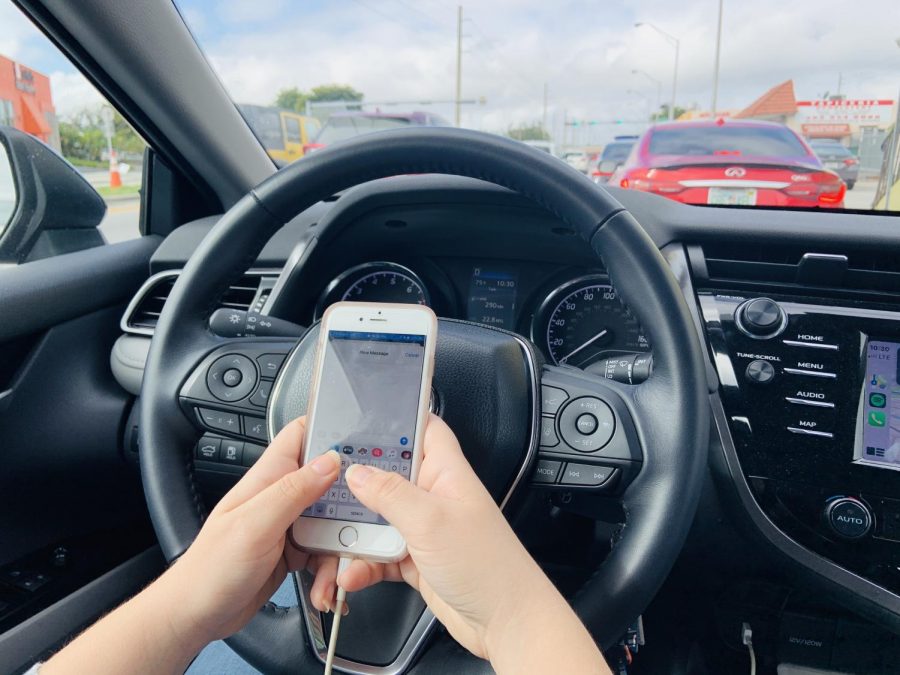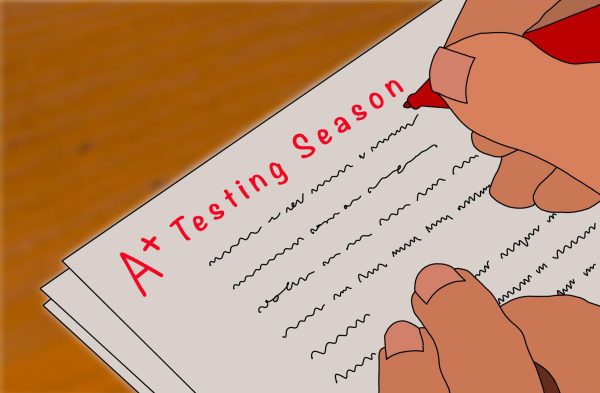Texting and Driving: Put it Down to Arrive Alive
Starting on January 1, texting while driving became illegal in Florida, a law passed by the Florida Legislature.
Jan 23, 2020
In this day and age, technology is an integral part of our daily lives. Almost everyone is entirely reliant on their devices, constantly feeling the need to check to make sure they are up to date with news and social media. Text messages, emails and phone calls are very tempting to check while driving, especially when they could be important, but doing so can cause fatal car accidents. Texting while driving has become a major issue, and many are unsure as to whether making that action illegal is crossing the line. However, legislation needs to be enforced to ensure driver safety and help minimize any distractions in order to reduce the amount of fatal accidents and help drivers acquire necessary self-control.
To begin with, texting and driving is one of the most common causes of fatal car accidents around the globe. Throughout the day, approximately 660,000 drivers attempt to use their phones while behind the wheel of an automobile, leading to 1.6 million crashes each year, as said by The National Safety Council. Answering a text takes away your attention for about five seconds. Traveling at 55 miles per hour, that is enough time to travel the length of a football field and, at any given point, the deviation of a driver’s attention onto something other than driving can result in fatal consequences. Drivers needs to learn how to have self-control, and although iPhones contain the “Do Not Disturb While Driving” feature, it is not necessarily something that everyone always adheres to.
“I think the texting and driving law should be enforced. Most people do not change their habits until they learn the consequences of their actions. I think if the law is imposed, people will have to face a mild punishment, but will learn not to do it again. This may be the wrong reason to stop texting while driving because one should realize that doing it could cost a life, but if it decreases the number of phone-related traffic issues, then that is good enough,” sophomore Manuela Tiburcio said.
In reality, enforcing the law will create a more strict standard to follow. In a busy city like Miami, everyone is in a rush to get to their destination and it is impossible to not encounter traffic. Not paying attention and lacking caution in such a crowded area is very dangerous, especially when it is nighttime, as the driver could be drowsy. 77% of adults and 55% of teenage drivers believe that they can easily manage texting while also managing on the road, but multitasking will not always be in everyone’s favor, and actually increases the chance of a crash to 23 times what it would be otherwise.
People might not think it is a big deal and that the law will lead to more control over them on the road, but limiting any distraction while driving can actually save a life. There are three types of distracted driving: manual, cognitive, and visual. Texting is all three types, and this shows how dangerous that action can be while driving. With this law, all drivers are forced to take the safeties of their passengers and their fellow drivers into account every time they drive. The law is not a way for the government to assert authority but rather a way to ensure safety and allow people to become self aware of their actions and the consequences that follow.
“I personally believe texting and driving should be enforced because a lot of people are involved in crashes for not having their eyes on the road and, you never know, one day when your eyes are focused on texting, you might end up in a crash,” junior Natalya Barbito said.
Enforcing the “Texting while Driving” law will create more necessary precautions and reduce the amount of fatal accidents that these distractions can cause. The roads should be a safe place for everyone, especially for teenagers who are just starting to learn how to drive and may be the ones most affected by texting and driving habits. By slowly learning how to actively practice self-control over the distractions of digital devices, the law will no longer be a bother, and lives will be saved as a result of it.
























